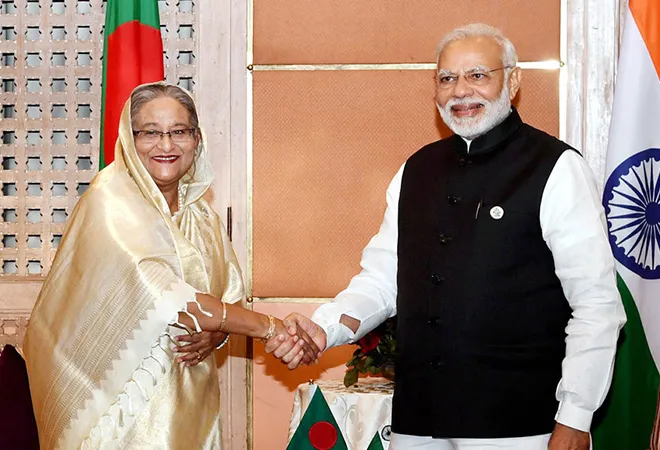In a telling statement, Sri Lanka’s new foreign secretary Jayanath Colombage has said that Colombo will have an “India first” strategic policy outlook. Arguing that while the Rajapaksa government has adopted a posture of neutrality in its dealings with major regional and global powers, he was categorical in underlining that “the president has stated that we have a strategic security-wise ‘India first’ policy because we cannot be, we should not be, we can’t afford to be a strategic security threat for India, period.” These are powerful words indeed, and along with Colombage’s acknowledgement that the decision to give Hambantota port on a 99- year lease to China was a “mistake”, it underscored the pitfalls of a rather infantile debate in this country about India’s neighbourhood policy in recent months.
There has been a barrage of criticism that India is “losing” its neighbourhood as border tensions with Nepal have grown and China has continued to spread its tentacles in India’s vicinity.
That Indian and Chinese forces are squaring off at the border has reinforced this plaintive cry that New Delhi is getting marginalised in the neighbourhood. Even foreign secretary Harsh Vardhan Shringla’s visit to Bangladesh, his first outside India since the Covid-19 lockdown, got mired in needless debates about rising Chinese clout in Dhaka.
By all accounts, Shringla’s visit to Dhaka was a successful one and it managed to convey Bangladesh’s privileged position in Indian foreign policy matrix. Against the backdrop of the two nations celebrating “Mujib Borsho”, and the 50th year of the liberation of Bangladesh as well as the establishment of diplomatic relations next year, this visit was key to setting the tone for a busy calendar of events ahead and a number of high-level bilateral visits. From expediting and conceptualising major connectivity projects to diversifying bilateral engagement, the two nations are getting serious about their priorities.
What is key here is the role played by top leadership in both nations. Both Narendra Modi and Sheikh Hasina, despite some domestic scepticism, understand the importance of cultivating strong bilateral relations. For Modi, the development of India’s East and Northeast is a top priority and a strategic imperative for New Delhi.
And that region can only achieve its full potential if it’s better integrated with Bangladesh, thereby ensuring that India-Bangladesh connectivity projects will continue to be at the top of the agenda. It is important to recognise that this connectivity push is being shaped by a politician like Narendra Modi who has been forthright about the challenges posed by illegal immigration. The fact that by next year India and Bangladesh are likely to have nine rail links is an indicator of how fast priorities in New Delhi are evolving.
There is also a growing desire on the part of the two nations to look beyond the Bengali-Bengali narrative and shape the engagement by bringing in new stakeholders more in sync with 21st century realities. There is a sizeable Tamil and Telugu population in Bangladesh in the textile industry and tech space, and a growing number of Bangladeshi students and medical tourists are now visiting South India, thereby changing the very complexion of this engagement.
It is, therefore, quite curious to suggest that India might be losing ground in Bangladesh. Of course, the all-pervasive China factor has to be reckoned with. In most of India’s neighbours, China has a seeming advantage that, unlike India, it is not part of the domestic political calculus. But, unlike India, it also does not have a long-term stake in the South Asian region.
It can afford to ignore the region, which it does, when its interests are not served. New Delhi doesn’t have that luxury. For good or bad, India’s future and that of its neighbours remain intertwined. So while China’s financial commitments to various countries in the region are much talked about, given their size, they are largely declaratory. Even in the China-Pakistan Economic Corridor, China’s actual spending has been quite limited, compared to the $62 billion amount which is often advertised. India’s declared loan commitments might be small, but when it comes to actual delivery, India is not far behind. Its loan terms and payment conditionalities are much better too.
For all the hue and cry about India “losing” the neighbourhood, the ground reality is quite different. With Bangladesh, Sri Lanka and the Maldives, New Delhi’s relations are robust and progressing well. Bhutan remains as close as ever and even in the case of Nepal, it was Prime Minister KP Oli who recently reached out to his Indian counterpart.
Afghanistan is passing through a difficult phase, but both the Afghan government and the Taliban leadership recognise India’s critical role in shaping their nation’s future trajectory. And all this has happened when India has been able to successfully marginalise Pakistan, regionally and globally.
To view India’s neighbourhood policy through the lens of “wins” and “losses” is to miss the structural imperatives that shape the outcome. A region shaped by two major powers will never have a linear trajectory. And such a narrative also does a great disservice to smaller nations in the region, which have their own agency in shaping their engagements with these powers. Finally, there has never been a golden period of foreign policy when New Delhi’s ties with its neighbours were seamless. Going by India’s historical record, Delhi’s regional outreach today is quite promising. Indian discourse today seems more driven by domestic political imperatives than by the empirical realities on the ground.
This commentary originally appeared in Hindustan Times.
The views expressed above belong to the author(s). ORF research and analyses now available on Telegram! Click here to access our curated content — blogs, longforms and interviews.




 PREV
PREV


